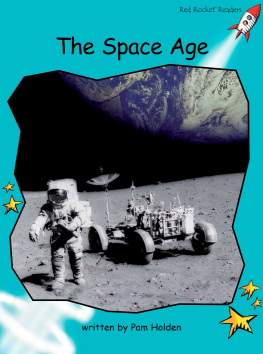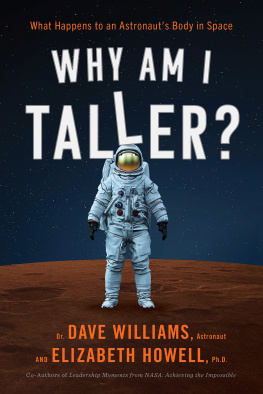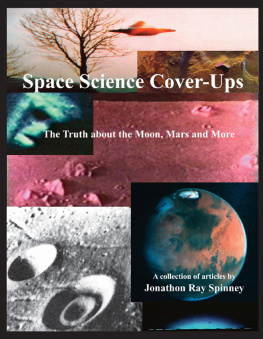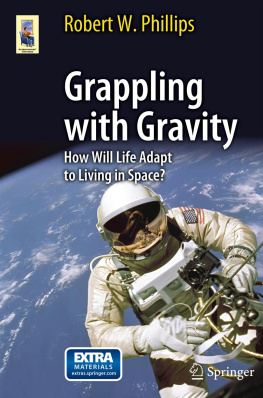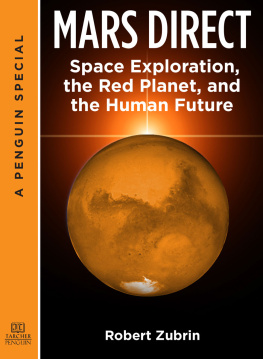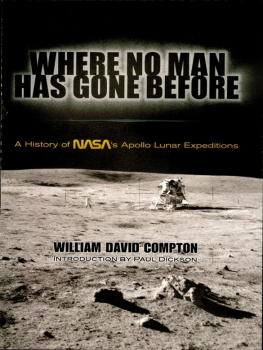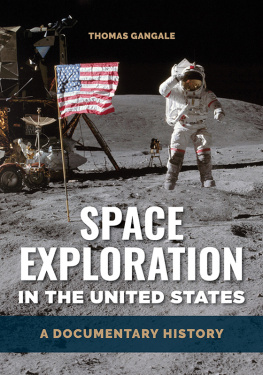MANKIND BEYOND EARTH
MANKIND BEYOND EARTH
THE HISTORY, SCIENCE, AND FUTURE OF HUMAN SPACE EXPLORATION
CLAUDE A. PIANTADOSI
COLUMBIA UNIVERSITY PRESS
NEW YORK

COLUMBIA UNIVERSITY PRESS
PUBLISHERS SINCE 1893
NEW YORK CHICHESTER, WEST SUSSEX
cup.columbia.edu
Copyright 2012 Columbia University Press
All rights reserved
E-ISBN 978-0-231-53103-0
Library of Congress Cataloging-in-Publication Data
Piantadosi, Claude A.
Mankind beyond Earth : the history, science, and future of human space exploration / Claude A. Piantadosi.
p. cm.
Includes bibliographical references and index.
ISBN 978-0-231-16242-5 (cloth: alk. paper)
1. AstronauticsUnited StatesForecastingPopular works. 2. Manned space flightHistoryPopular works. 3. Outer spaceExplorationPopular works. I. Title.
TL789.8.U5P53 2012
629.4500973dc23
2012017631
A Columbia University Press E-book.
CUP would be pleased to hear about your reading experience with this e-book at cup-ebook@columbia.edu.
COVER ART: CHESLEY BONESTELL, EXPLORING MARS, REPRODUCED COURTESY OF BONESTELL LLC.
COVER DESIGN: CHANG JAE LEE
References to websites (URLs) were accurate at the time of writing. Neither the author nor Columbia University Press is responsible for URLs that may have expired or changed since the manuscript was prepared.
Civilization is obliged to become spacefaringnot because of exploratory or romantic zeal, but for the most practical reason imaginablestaying alive.
CARL SAGAN
CONTENTS
NASAs space shuttles retired in 2011 after an impressive thirty-year career. Two terrible accidents aside, the Space Shuttle Programs 135 missions epitomize the best of human spaceflight since the Apollo lunar landings of 1969 through 1972. The shuttle program produced many unforgettable highlights, but most important, without it we could have never built the International Space Station (ISS), a technological tour de force of which we all should be proud.
Not all the news, however, is good. The reasons to explore space first dawned on me as an eighth grader, when I carefully prepared my first science project on the Red Planet, and the urgency of those reasons has only increased. But in becoming a scientist, I was taught to see problems, and Houston, we have a problem. The shuttle program confirmed the high risk and cost of sending people into space, despite the attendant benefits, and the reality took the bloom off the rose long ago.
The shuttle was expensive, undependable, and overdue for the museum when the program ended, but we have no consensus on whats next for Americas manned spaceflight program. Should we focus on our investment in the ISS, intercept an asteroid, or go back to the Moon? And what about Mars? These are all figuratively and literally moving targets, and the decisions we must make are difficult ones.
The ISS was expensive to build, and it has been underutilized and undercapitalized. NASA understood this and managed to extend its working lifespan until 2020. Yet today, NASA has no heavy-lift launch capability. Thus we are now paying the Russian Federation to transport our people to the ISS. The 2011 deal pays the Russians 62.7 million dollars per seat to ferry, in 2014 and 2015, on Soyuz spacecraft, a dozen American astronauts to the ISS, and the test date for a new American launch vehicle has slipped to 2017 at the earliest. Confronted with these facts and figures, I hope you ask, How did we arrive at this state of affairs? rather than, We farm out everything else, so why not space exploration?
This situation is unprecedented. America has been the unquestioned leader in space since Project Apollo, but today we seem indifferent, at best, about our space program. In a world of virtual worlds, we can explore everything under the sun without ever leaving our Web browser, but cyberspace offers only what someone, someplace already knowsnothing more. The discovery of the unknown is the purpose of science, and therein lies real excitement. There is much to learn in space, and people (astronauts) can still discover things that machines (robots) cannot.
I dont want to give the wrong impression: robots are indispensable and will always go where we cannot. We need complementary goals for manned and unmanned space exploration, and both implemented at a price we can afford. What new space technologies are essential? Where should the government focus its investment in spaceflight? Which private-sector enterprises should be capitalized by federal dollars?
These are big questions at a time when a postrecession federal budget has spiraled out of control, government expenditures are huge and expanding, and our elected officials are hamstrung by conflicting priorities and political insecurities. Moreover, many politicians are skeptical of the ability of Americans to make informed judgments about science, and some influential people have become confused, indifferent, or even obstructionist. President Obamas speech at Cape Canaveral in 2010 opened some eyes when he cancelled Project Constellation and said, I understand that some believe that we should attempt a return to the surface of the Moon first, as previously planned. But the simple fact is we have been there before.
Project Constellation was indeed in political and financial trouble, but the Moon is 1.5 times larger than North America, and we have only explored an area of it the size of Manhattan. Imagine if Isabella had decided not to send Columbus back to the New World because he had been there before! Mr. Obama has appeared to support human space exploration, but he has taken highly questionable advice in pointing us at near-Earth asteroids, under the guise of avoiding celestial Armageddon. Statistically, life on Earth being annihilated by an asteroid is far less likely than some of the terrible things we humans can alreadyand may very welldo to ourselves. Astronauts may not fly under the Stars and Stripes again until 2020, leaving just five years to prepare for an asteroid mission, and this policy has raised eyebrows for those people committed to the continuity of space exploration.
Most Americans are either unsure of what to make of this or are too preoccupied to notice. Indeed, public perception of our manned spaceflight program is fickle, and a certain amount of disinterest can be chalked up to our waning scientific literacy. According to the National Center for Education Statistics, in 2006 the average American high school student ranked seventeenth internationally in science knowledge, between Iceland and the Slovak Republicand well below our Canadian neighbors. Perhaps its no surprise that so few of us seem concerned about how this portion of our tax dollars are being spent.
In opinion polls, most Americans do view the space program favorably, at least until cost and risk are factored in, but most also do not see a compelling reason for a continued human presence in spacenor the value in the tax dollars spent on it. But even during the heady days of Apollo, only half of Americans felt that the money spent on lunar exploration was worthwhile. This is a curiously weak endorsement of an achievement that occupies a niche in history alongside the discovery of the New World. Some respectable scientists, too, question NASAs scientific returns on investment, but these critics rarely suggest realistic milestones as alternatives. Given all of this, there is good reason for a nonaligned but informed scientist to explain, in plain language, the fiscal, technological, and biological problems involved in pushing human exploration of space to the next level. In fairness, I am not fully disinterested; my center has worked on NASA contracts on and off for twenty yearsbut I am not a NASA man.
Next page

